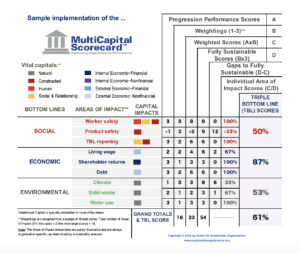Birthplace & Historical Archive of Multicapitalism & Context-Based Accounting
Multicapitalism – A new economic doctrine for sustainability in commerce*
 If we can say that the world’s prevailing economic doctrine (capitalism) largely boils down to prioritizing impacts on only one type of capital (economic) with shareholder well-being in mind – and we think we can – the time has come for a new form of commerce in which performance is assessed in terms of impacts on all vital capitals and with stakeholder well-being in mind.
If we can say that the world’s prevailing economic doctrine (capitalism) largely boils down to prioritizing impacts on only one type of capital (economic) with shareholder well-being in mind – and we think we can – the time has come for a new form of commerce in which performance is assessed in terms of impacts on all vital capitals and with stakeholder well-being in mind.
Monocapitalism, that is, must give way to multicapitalism, the maintenance of all vital capitals of importance to us all. First put forward by Mark McElroy and Martin Thomas in 2014, the performance accounting implications of multicapitalism were later explained in their 2016 book, The MultiCapital Scorecard – Rethinking Organizational Performance.
Vital Capitals
Capital theory in the sustainability and economics literatures expresses the view that there are five broad categories of capital: natural, human, social & relationship, constructed and economic. Included in economic capital is financial or monetary capital; and included in human, social & relationship, constructed and economic capitals is intellectual capital.
Organizational performance, then, can be thought of in terms of what a company’s impacts on vital capitals are relative to norms, standards or thresholds for what they would have to be in order to be sustainable. Performance accounting should be oriented accordingly.
Integrated/Context-Based Thinking
As a doctrine, multicapitalism is the evolutionary result of Context-Based Sustainability (CBS), a methodology initially devised for non-financial accounting only. What’s new and exciting about multicapitalism, therefore, is the manner in which it expands CBS to include financial performance. Multicapitalism, that is, finally makes integrated Triple Bottom Line management and accounting possible. This changes everything.
To help address the challenge of operationalizing multicapitalism in business, we co-created and fully support the world’s first and most advanced, context-based (and open-source) integrated methodology for measuring, managing and reporting the performance of organizations in a way that takes impacts on all vital capitals – and their upper and lower limits – into account: the MultiCapital Scorecard. If there are twenty-five things that have to happen in order to make sustainable commerce possible, this is certainly one of them!
*The terms multicapitalism and monocapitalism were first coined and defined by Martin Thomas and Mark McElroy in 2014, and further developed in their 2016 article and book, “Does Sustainable Performance Mean Abandoning Capitalism?” and The MultiCapital Scorecard, respectively, and in many other articles and presentations by them that followed. The doctrine of multicapitalism is an original contribution of theirs to the field of economics and business.
The Center for Sustainable Organizations
What differentiates CSO from others in the sustainability arena is its strong commitment to an approach for corporate sustainability measurement, management and reporting that is context-based
